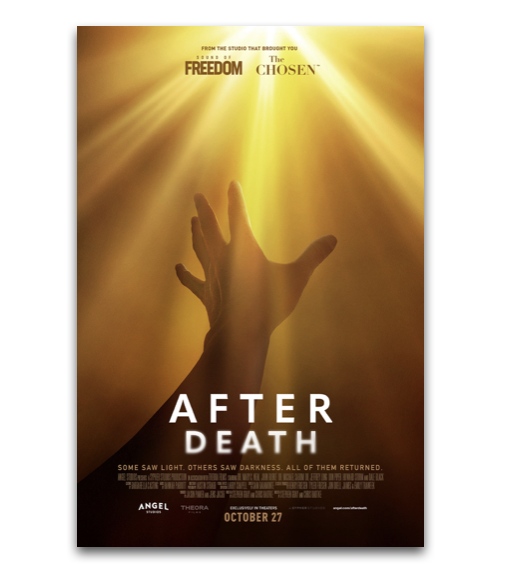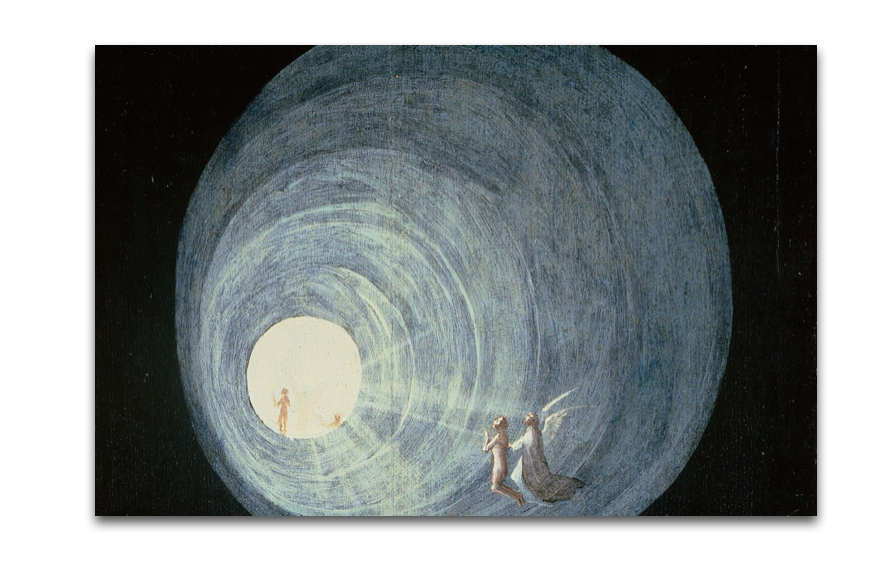Cardiac Arrest May Cure Consumerism
 Last week I went to the theater with our pastor and his wife’s small group to see, After Death, which is a documentary exploring NDE’s (Near Death Experiences), produced by the same people responsible for The Chosen. I wasn’t sure what to expect, but I was pleasantly surprised by their approach to this complex, and at time, easily dismissed, subject. This film follows the stories of several individuals who claim they experienced the other side during cardiac arrest. It also contains the research journeys of psychiatrist, cardiologists, and physicians who eventually became open to the idea that consciousness is not produced by the brain, and life continues after bodily death.
Last week I went to the theater with our pastor and his wife’s small group to see, After Death, which is a documentary exploring NDE’s (Near Death Experiences), produced by the same people responsible for The Chosen. I wasn’t sure what to expect, but I was pleasantly surprised by their approach to this complex, and at time, easily dismissed, subject. This film follows the stories of several individuals who claim they experienced the other side during cardiac arrest. It also contains the research journeys of psychiatrist, cardiologists, and physicians who eventually became open to the idea that consciousness is not produced by the brain, and life continues after bodily death.
If you’ve read some of my previous post, you may have noticed that NDE’s is a subject near and dear to my heart. It seems to show up every so often in my posts. Over the last twelve years I’ve spent countless hours reading, listening to, and interviewing both experiencers of this phenomenon and those who have researched it in academic contexts. One of the people I flew out to interview for my NPO project was Dr. Raymond Moody, a pioneer on this topic and the person who first coined the term “near death experience”, in the mid- seventies. He was one of my “outlier voices” for my year of discovery. We discussed his book, God is Bigger Than the Bible. Yeah, I was intrigued as well.
I couldn’t help but see how NDEs are pertinent to the conversation around consumerism, and in particular desire, that Dr. Jason Clark explores in his paper, Evangelicalism and Capitalism. Both Vincent Miller in, Consuming Religion, and Dr. Jason Clark argue that aspects of western consumerism impact religious faith and human desire in negative ways. Miller views consumerism as an interpretive force that has the ability to commodify virtually anything, including religion and tradition. Everything becomes “content to be commodified, distributed, and consumed”.[1] Consumerism not only reshapes values, but creates a disconnect between belief and practice.[2] This consumeristic framework, as subtle as it can be, can nurture individualism and promote self-centeredness in both secular and sacred environments, which runs counter to what many feel is the heart of the Christian faith.
I was thankful that Dr. Clark, did not take the route of attacking or demonizing culture, but rather proposed ways to redirect desire to what helps individuals and communities become spiritually healthier. He takes wisdom from Augustine who warns against “reducing culture to something completely antithetical to God”.[3] Instead, Jason proposes another solution to western cultures fixation on profit, materialism, competition, and consumerism. He says, “Real revolution is about nurturing the flow of desire, rather than its destruction: It is the need to exceed the desire fostered by capitalism with a re-ordered desire.”[4] This is where my NDE research makes its way into the conversation.
The Perceptual Studies Department at University of Virginia, and other research organizations, have compiled thousands of NDE cases throughout the world over the last thirty years and have noticed some striking characteristics that remain with experiencers years after their initial NDE. When individuals experience the other side, or at least believe they have, they report encountering God, spiritual beings, deceased family and friends, an educational life review, and profound revelations. This very spiritual experience transforms their beliefs and attitude concerning life and causes previous desires to increase and others to decrease.
What increases and decreases with Near Death Experiencers?
Lessened concern for material gain, recognition, or status
Decrease in competition with others
Greater desire to serve others
Increased compassion and love for others
Increase in mission and purpose
Heightened self-esteem (Identity)
Deeper religious faith or heightened spirituality[5]
Many of the negative effects western consumerism or capitalism produces like heightened individualism, competition, greed, disregard for others of lower status, and materialism is short circuited by these spiritually transformative experiences. These people are given a new image of what life is about and view themselves as children of God which inevitably changes their desires. As children of God, they realize they are surrounded by their brothers and sisters, which decreases their competitive drives in all kinds of arenas, including the free market. 
One individual who had an NDE left his fortune five hundred company, with all its perks, high paying salary, and prestige to start a boy’s home. His experience radically changed how he measured and defined success. In fact, many of these NDErs leave their careers to pursue what they believe to be more meaningful work. As stated earlier, their concern for material gain, recognition, competition, and status lower. Their desires are redirected to other things. God and people truly become their priority in practice, not just in theory, as Miller states was the main concern of his book.[6]
Of course, not everyone will have a near death experience, thank God, but I believe this phenomenon supports both Vincent Miller and Jason Clark’s argument that the most effective remedy to the negative effects of western consumerism and capitalism is spiritual, theological, and educational in nature. Spiritual awakenings, healthier theologies, good education, critical thinking, and spiritual practices have the best chance at redirecting western consumeristic desires to things that bring life.
[1] Vincent J. Miller, Consuming Religion: Christian Faith and Practice in a Consumer Culture (New York: Continuum, 2008), 179.
[2] Miller, Consuming Religion, 19.
[3] Jason Paul Clark, “Evangelicalism and Capitalism: A Reparative Account and Diagnosis of Pathogeneses in the Relationship” (DMIN diss., George Fox University, Newberg,2018), 202.
[4] Clark, Evangelicalism, 174.
[5] Holden, Janice Miner, Bruce Greyson, and Debbie James, eds. The Handbook of Near-Death Experiences: Thirty Years of Investigation, (Santa Barbara, Calif: Praeger Publishers, 2009), 46.
[6] Miller, Consuming Religion, 19.
8 responses to “Cardiac Arrest May Cure Consumerism”
Leave a Reply
You must be logged in to post a comment.
Hey Adam,
It seems like “After Death” struck a chord with you connecting to your standing fascination with near death experiences (NDEs) and how they profoundly shape our personal values and societal norms.
It was interesting to see how your research aligns with criticisms of consumerism in how transformative experiences like NDEs can redirect our desires away from materialism and towards a more community focused and spiritually fulfilling existence.
Your work does a great job of bridging the gap between theories and tangible changes, in the world—an impressive accomplishment! Have you noticed whether sharing these stories with others has significantly influenced their perspectives or behaviours?
Thanks for the response Mathieu, and to answer your question. Yes. It has for me first and for many I’ve shared it with over the years. I shared these stories and information with a friend and he asked if I could do a two part NDE episode for his podcast series due to its impact on him.
The amount of credible research (if you know where to look) on this subject and the patterns that show up all over the world is pretty overwhelming. I think there is a lot of wisdom and validation for our faith found in this community.
Hi Adam,
I enjoyed reading about NDE.
It started my thinking…Sometimes a knock to the head, or a Near Death Experience helps to readjust our life priorities. Sometimes war does the same…
Several churches and pastors are taking Ezekiel 38:1-39:16 prophecies of “Gog and Magog” to heart. In the face of conflict (Holy Violence – Walker) perhaps we might see a reset of personal, cultural, and national priorities.
Shalom…
I’m glad you enjoyed the post, this subject is fascinating and there is alot of solid research on this subject at this point in human history, if you know where to look. Agreed, I think any type of heavy experiences that remind us of our mortality or the “bigger picture” has a way of recalibrating us. Unfortunately we still live in a world where war and violence are necessary to protect the innocent and maintain justice in the world. Appreciate the people who step in harms way for the sake of others like you have done my friend.
Adam,
Thank you for your post. Yes. . . The Great Suppression must end, replacing it with followers of Jesus experiencing spiritual awakenings, desire for Biblical truth that leads to healthier theologies, critical thinking, and replacing the practices that deform us with spiritual practices that transform us more and more into His likeness, fully trusting in Who He is and how He loves us.
Appreciate the response Cathy, much of my NPO is around questions concerning the Bible and biblical truth in America, especially the American south. Everyone seems to have their version or understanding of it which leads to a lot of debate and discussion around here (not a bad thing at all), however I don’t think we can go wrong by doing what you mentioned, “trusting in Who He is and how He loves us”.
“Spiritual awakenings, healthier theologies, good education, critical thinking, and spiritual practices have the best chance at redirecting western consumeristic desires to things that bring life.” I’m curious if you can think of your own “Spiritual Awakenings”? What would you say was the pathway it sent you down? I am so facinated by your study of NDE’s!
Absolutely, I was 16 when I had my first God experience that changed my life forever. I grew up in a Charismatic church so we were encouraged to pursue direct encounters with God and it happened. I was praying one night at an alter and I got overwhelmed by a divine love that turned my worldview and “lens” upside. I cried for about 3 hours and didn’t want to lose the love I was feeling. As much as I’ve had questions about religion and my tradition, that experience has always been a key moment. I’ve had others since then, but not as potent as that one. The path it sent me down was less dogma, less judgement, more curiosity, and more of an emphasis on Christ’s love.
Thanks Jana, it is fascinating. After years of talking with NDErs God’s love and love for others is consistently the priority and takeaway from their experiences. In a small way, I could relate to what they claimed they experienced. A lot out good research, if you know where to look, out there on this subject now which is exciting!